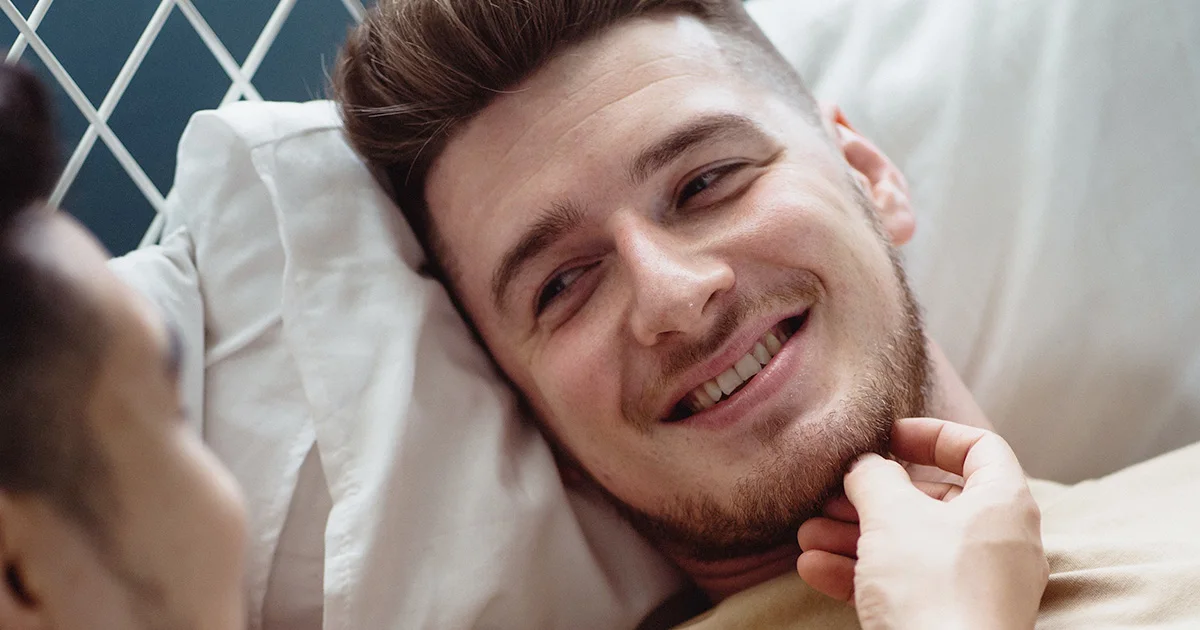Key takeaways
Viagra (sildenafil) is used to make it easier to get an erection by increasing blood flow to the penis, but it doesn’t work unless you’re aroused.
While Viagra won’t make you horny, there may be benefits to the drug beyond just harder erections: it could boost a man’s confidence in his ability to perform in bed as well as reduce stress around sex that can stem from erectile dysfunction, thereby improving intimacy and arousal.
Here's what we'll cover
Here's what we'll cover
Key takeaways
Viagra (sildenafil) is used to make it easier to get an erection by increasing blood flow to the penis, but it doesn’t work unless you’re aroused.
While Viagra won’t make you horny, there may be benefits to the drug beyond just harder erections: it could boost a man’s confidence in his ability to perform in bed as well as reduce stress around sex that can stem from erectile dysfunction, thereby improving intimacy and arousal.
Viagra, the renowned blue pill, has been a game-changer in the world of erectile dysfunction (ED) treatment. Since its introduction, it has helped countless men regain their sexual confidence and performance. However, amidst the success stories, there's a persistent question that frequently arises: Does Viagra make you hornier? In this article, we'll delve into the science behind Viagra's mechanism of action and its impact on sexual desire, debunking the myth and shedding light on its true effects.
Understanding how Viagra works
Before addressing whether Viagra enhances sexual desire, it's crucial to understand how the drug works. Viagra's active ingredient, sildenafil, belongs to a class of medications called phosphodiesterase type 5 (PDE5) inhibitors. These drugs work by increasing blood flow to the penis, helping men achieve and maintain an erection when sexually aroused, making penetrative sex possible.
And while blood flow to the penis and an erection are crucial for penetrative sex, if you aren’t aroused, the medication won’t work at all. And unfortunately, Viagra doesn’t help you get aroused. That said, sexual arousal is complex and there are definite psychological aspects of arousal that may be influenced by treatment for ED.
Physical response vs. libido
One of the most common misconceptions is that Viagra boosts libido or sexual desire. However, it's essential to differentiate between the physical response and the psychological aspect of sexual arousal. Viagra primarily focuses on the physical response by enhancing blood flow to the genital region, thus enabling an erection. While a successful erection might contribute to an overall heightened sense of arousal, it does not directly impact one's innate sexual desire or libido. Also, it’s important to understand that Viagra doesn’t automatically give you an erection. You need to be aroused for the drug to work.
Viagra's impact on sexual desire
While there are piecemeal studies about the effects of Viagra and drugs like it on quality of life or other parameters that might affect a person’s sex drive, the primary function of the medication is to facilitate the physiological process necessary for an erection. Therefore, an individual's level of sexual desire remains largely unaffected by the drug. It's crucial to recognize that Viagra is not an aphrodisiac; it won't magically intensify your desires or fantasies.
Psychological factors and expectations
It's worth acknowledging that some individuals might experience a psychological shift in perception after taking Viagra. Since the medication helps them achieve and maintain an erection reliably, they might feel more confident about their sexual performance. This newfound confidence can create a positive feedback loop, where increased self-assurance leads to an enhanced sense of desire. However, this is not a direct pharmacological effect of Viagra on libido but rather a psychological response.
Viagra's primary mechanism of action does not involve increasing sexual desire. Instead, it aids individuals with ED in achieving and maintaining an erection during sexual activity. However, there are some indirect ways in which Viagra might affect desire:
Confidence boost: Successfully overcoming ED with the help of Viagra can boost a man's confidence in his ability to perform sexually. One study published in the International Journal of Impotence Research showed that men who used a similar medication to treat erectile dysfunction had increased self-confidence in their ability to get an erection directly tied to improvements in their ED. Increased self-assurance may lead to a more positive attitude towards sexual activity, potentially enhancing desire.
Improved relationship dynamics: ED can strain relationships due to sexual frustration and anxiety. By addressing ED with Viagra, couples may experience improved intimacy and communication, which could contribute to an increase in sexual desire.
Reduced performance anxiety: For some men, the fear of not being able to perform sexually can be a significant source of anxiety. Viagra's effectiveness in promoting erections can alleviate performance anxiety, potentially allowing individuals to focus more on their desires.
It's important to note that these potential effects on sexual desire are indirect and vary from person to person. While some individuals may experience an increase in desire due to improved confidence and relationship dynamics, others may not notice any change in their level of sexual desire after taking Viagra.
When to visit a healthcare provider
If you are concerned about your sexual desire or experiencing difficulties with arousal, you may want to consult with a healthcare professional. They can help determine whether there are underlying physical or psychological factors contributing to these issues and provide appropriate guidance and treatment options. Also, there are many medications that can affect your libido, as well as your ability to get and maintain an erection, including antidepressants, antipsychotics, opioids, blood pressure medications, and more. Speaking with a licensed healthcare professional about your medical history can help uncover any underlying issues and facilitate better sex.
Furthermore, Viagra is a prescription medication, and it should be taken under the supervision of a healthcare provider. They can assess your specific needs and prescribe the appropriate dosage based on your medical history and overall health.
The bottom line
So while Viagra doesn’t make you hornier in the sense of increasing sexual desire, it addresses the physical aspect of sexual function by improving blood flow to the penis, helping men with ED achieve and maintain an erection when sexually aroused.
Any perceived increase in sexual desire while taking Viagra is often linked to improved confidence, better relationship dynamics, or reduced performance anxiety. These effects are indirect and vary from one person to the next.
Ultimately, if you have concerns about your sexual desire or erectile function, it's crucial to consult with a healthcare professional who can provide personalized guidance and recommend appropriate treatments or therapies tailored to your specific needs. Remember, sexual health is a complex and individualized matter, and there is no one-size-fits-all solution.
DISCLAIMER
If you have any medical questions or concerns, please talk to your healthcare provider. The articles on Health Guide are underpinned by peer-reviewed research and information drawn from medical societies and governmental agencies. However, they are not a substitute for professional medical advice, diagnosis, or treatment.
Viagra Important Safety Information: Read more about serious warnings and safety info.
Dording, C. M., LaRocca, R. A., Hails, K. A., et al. (2013). The effect of sildenafil on quality of life. Annals of Clinical Psychiatry : Official Journal of the American Academy of Clinical Psychiatrists, 25(1), 3–10. Retrieved from https://pubmed.ncbi.nlm.nih.gov/23376864/
Irwin, G. M. (2019). Erectile Dysfunction. Primary care, 46(2), 249–255. https://doi.org/10.1016/j.pop.2019.02.006. Retrieved from https://pubmed.ncbi.nlm.nih.gov/31030826/
Sontag, A., Ni, X., Althof, S. E., & Rosen, R. C. (2014). Relationship between erectile function and sexual self-confidence: a path analytic model in men being treated with tadalafil. International Journal of Impotence Research, 26(1), 7–12. https://doi.org/10.1038/ijir.2013.31. Retrieved from https://pubmed.ncbi.nlm.nih.gov/23864107/










